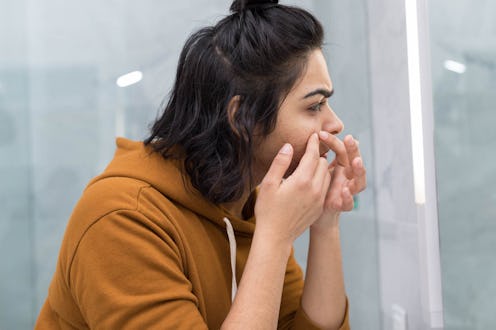Life
Science Is Getting Closer Than Ever To An Acne Vaccine

Most of us have had pimples at some point in our lives. Zits, technically known as acne vulgaris, occur in almost 100 percent of all adolescents, from mild pimples (classed as grade one) all the way up to cystic, scarring breakouts (grade four). And it's thought to last about 10 to 12 years, so if you got it in your late teens, you'll likely experience it into your 30s. (Sorry.) But if you're looking to not have acne, there's a new hope, both for spotty teens and for adults who really thought they were done with pimple creams. A new development in skin research, published in the Journal of Investigative Dermatology, means that a vaccine for acne may be closer than ever.
You may have been taught that acne is caused by excessive sebum or oil on the skin, but the creation of a pimple is a bit more complex than that. And it's that complexity that the vaccine might treat in the future. The scientists behind the study looked at the Propionibacterium acnes (P. acnes) bacteria, which lives on our skin all the time. It's just part of average skin flora, but it can also be involved in the production of pimples. And it also produces something called the CAMP factor, which is actually kind of a mouthful: the Christie-Atkins-Munch-Peterson factor. The CAMP factor is a toxic protein, and for the first time the scientists behind the study showed that it's actually a big part of the process of acne, because it causes skin inflammation. So CAMP factor needs to be restrained to combat pimples long-term. But how?
The scientists created a trial 'vaccine' that sent antibodies in to battle the CAMP factor and make it less intense — and it worked. Mice who had an injection of the antibodies seemed protected against the CAMP factor's pimple-inducing powers, and samples of human skin indicate it might work on us, too. It's not just a spot treatment: It's supposed to be a long-lasting vaccine that stops pimple inflammation in its tracks.
This is a big deal because, as the scientists explained in a press release, it's the first acne treatment that's trying to use the bacteria naturally found on our skin rather than random introduced dirt or pathogens that irritate our pores. But they also note that we're a long way from an actual vaccine— precisely because P. acnes bacteria are so important to our normal skin.
A vaccine for acne could have wide-ranging impact. Acne medication side effects can cause everything from seriously dry skin to antibiotic resistance, irritable stomachs, or depression in people who take them, according to Healthline. And making a vaccine based on miniature adjustments to the bacteria we all have on our skins already will have to be really precise, because those bacteria have important jobs to do. Making them less effective will damage our health and cause bigger skin problems down the line. So trials on actual humans with pimples need to be set up to test how to use this discovery without causing unintended consequences.
If you've currently got acne vulgaris, it's not likely that the vaccine will turn up while you're still experiencing pimples. But it might be the future of pimple fighting — and imagine the relief of millions of teens who might be inoculated against acne, as easily as they are against flu.